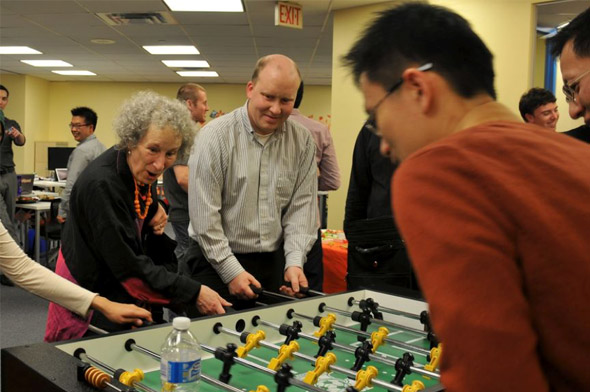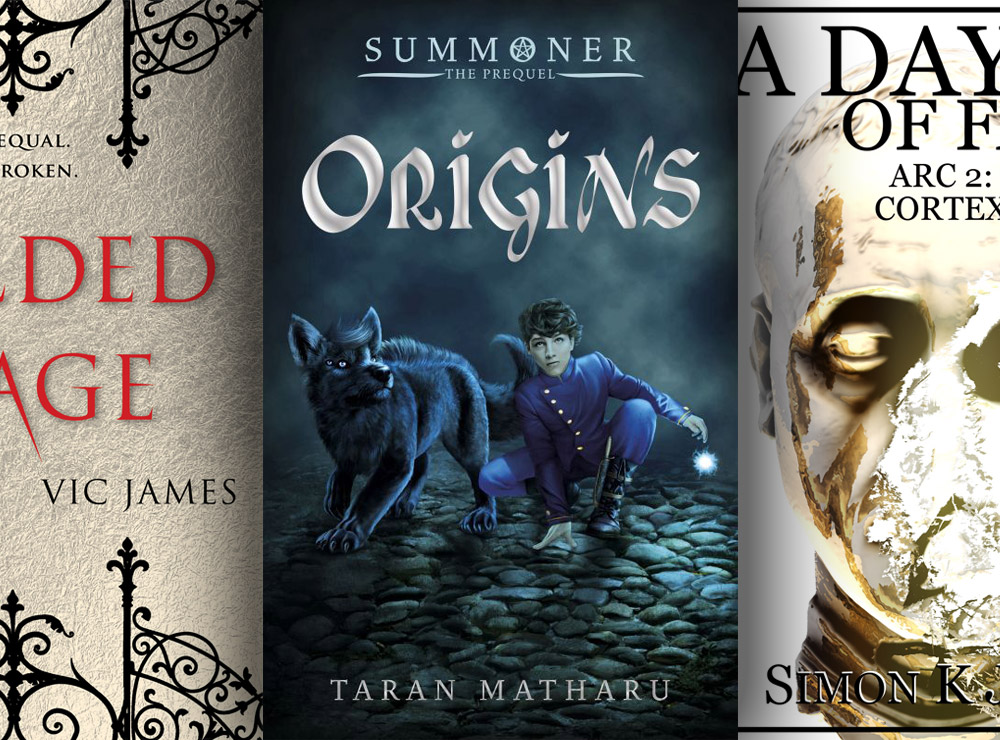Beyond the invention of the printing press, literature has had the advantage of being a low technology art form. Have a pen and paper and you could aspire to be a writer; pick a book off a shelf and you’re a reader. In the digital era the landscape has tilted, with literature no longer inextricably linked to paper and the path from writer to reader being considerably changed.
While ebooks provide a direct digital equivalent for analogue consumption, other modes of writing and reading have emerged which impact more overtly on the craft itself. Just as blogging upturned and repositioned journalism, broadening the range of content and softening the checks on quality, so platforms such as Wattpad have created new spaces for writers and readers.
Following a similar trajectory to YouTube, what began as a wholly amateur and youth-oriented community has since matured and diversified into a far more complex entity, home to the entire spectrum of writers from complete beginners to the self-published and traditionally published with a readership of 45 million.
In an attempt to unpick Wattpad and find out where it belongs in the literature world we talked directly with the platform’s designers as well as three writers with divergent experiences of the platform.
As an unpublished, 22 year old writer, Taran Matharu wrote his first book during NaNoWriMo in 2013, publishing every day throughout November. The regular schedule combined with the quirks of Wattpad’s algorithms propelled the story to over three million reads in six months; his books are now published internationally and feature prominently on Young Adult best seller charts.
Vic James already had a professional career as a TV producer and director for the BBC and Channel 4 and had twice judged The Booker Prize when she took to Wattpad to publish Slavedays. A quarter of a million reads and a Watty Award later and the redrafted story is being published through Pan MacMillan and Random House as Gilded Cage, with the ebook already available and the print version coming in early 2017.
Simon K Jones began serialising his story A Day of Faces on Wattpad in 2015, publishing a new chapter each week. The now-completed story has organically gathered over 84,000 ‘reads’, a readership which would have been unthinkable to an unpublished, amateur writer in the pre-digital age.
ILS: Is Wattpad a distribution system, a community, or a social platform?
Wattpad: It can be considered all three, but community is at the heart of Wattpad. Wattpad creates direct connections between storytellers and audiences around the world.
Simon: Publishing short fiction on my own blog never quite seemed right, and certainly never attracted any readers. That search for a platform which was dedicated specifically to sharing fiction is what led me to Wattpad. It seemed to have the least number of barriers between writer and reader.
Wattpad: Wattpad has been recognized as one of the positive and most supportive places on the internet. People make lifelong friends and life changing connections on Wattpad.
Simon: The writing community is very open and supportive, so a lot of the reading I do on Wattpad is actually about Wattpad. The way the platform is designed affects the pacing, structure and style of the writing, and adapting to its particular strengths and weaknesses was an interesting challenge. Lots of people have gone through that process, fortunately, and are more than happy to share their knowledge.
ILS: Wattpad’s structure lends itself to serialisation, a form which was far more common in literature in the 19th century. Why has modern digital technology led to a resurgence of an older creative form?
Wattpad: Every time a Wattpad storyteller adds a new chapter, every one of their followers receives a notification that brings them right back to the story. Regular updates keep a community engaged and coming back. When thousands of people are engaged with a story at the same time, it’s like a giant fan-club where readers comment on plot-twists and guess what happens next.
Simon: Initially I was publishing standalone short stories, which never gained any traction. Committing to publishing A Day of Faces in weekly instalments made all the difference and readers started to be pulled in through a kind of exponential osmosis.
Vic: I was looking for something that would keep me accountable to a writing schedule, so I made myself write and post a chapter a week on Wattpad. When people started reading it and leaving lovely comments, that was even more of an incentive! So it’s thanks to Wattpad that I got that all-important first draft written.
Simon: Because I was writing the book as I was publishing it, this rapidly created a feedback loop, whereby I would be receiving feedback on the previous chapter while writing the next.
Wattpad: Readers can influence how that story unfolds, too. Like in town-squares and around campfires of the past, the audience needs to be present and engaged for a digital story to perform at its best.
ILS: How does Wattpad’s technical design and structure influence the artistic output of its writers?
Wattpad: Last year, we launched a new multimedia feature that allows storytellers to add multimedia elements to their Wattpad story. As a result, the community began to share comic books and graphic novels, recipes, travel diaries, fashion blogs, and more visually-rich stories.
Remix culture is also huge on Wattpad. People create book trailers, fan-art, and even story covers for their favourite creators. Some go so far as creating social-media accounts for characters from Wattpad stories.
Simon: If readers are enjoying your work on Wattpad you receive notifications. There’s a magic of sorts when you know, in real time, that a reader somewhere in the world is moving through your story, chapter-by-chapter. That’s an experience you can’t get from a traditionally published book, or even ebooks.
ILS: Wattpad has charted a similar route to YouTube, with content becoming increasingly diverse and sophisticated. Was this always the intent, or was it a natural, evolving process?
Wattpad: Co-founders Allen Lau and Ivan Yuen put a lot of time and effort into fostering a community that was inherently positive and welcoming. Sharing a story can be a nerve-racking experience, and we do our best to create a supportive environment for storytellers and audiences.
Simon: Anyone can publish their work online – and that brings with it all the positive and negative consequences you might expect.
ILS: Have Wattpad’s algorithms replaced the traditional gatekeeping roles of the agent, editor and publisher?
Wattpad: In terms of content popularity on Wattpad, we don’t play gatekeeper. It’s important to us that we let the audiences on Wattpad decide what they like best. By regularly monitoring trends on Wattpad, we’re able to support and grow the categories and content that resonate with audiences. Our CEO Allen Lau wrote a great blog post about this sort of work.
Wattpad has access to data and insights that agents, editors, and publishers (along with producers, studios, networks, etc.) want. Our algorithms help us spot content trends, popular works, and emerging voices. These are just some of the reasons our partners work with us through Wattpad Studios.
Simon: Content overload existed before the internet – you can never read all the books – and the existence of enormous libraries like Wattpad compound that slight feeling of hopelessness. The most accessible stuff for me emerges from the short fiction competitions – bite-sized and extremely diverse writing.
Wattpad: It speaks to a larger shift in content-creation. The next generation of storytellers won’t look to gatekeepers for approval, they’ll post their stories using apps like Wattpad and will build their own audiences via social media and the internet. The direct relationship between writer and reader will be the norm and maintaining personal connections with fans will be critical in determining how successful a writer becomes in the digital age.
ILS: Does Wattpad see itself as a disruptive force in the publishing industry?
Wattpad: We are certainly complementary to the traditional industry. Wattpad has developed strong relationships with every major publisher in North America, and many others around the world. These publishers use Wattpad to connect their authors to existing and new fans and promote their works. Publishers have also used Wattpad to discover new writers through writing contests.
Taran: Wattpad acted as proof of concept, and proof of good writing. It got my work in front of agents faster and was an extra string to my bow when the book was being considered by publishers. That being said, it was more of an edge than a game changer, a catalyst rather than a reagent.
ILS: All of Wattpad’s content is free to read. What does Wattpad’s model offer to writers who wish to make a living from their work?
Wattpad: The success of writers on Wattpad is important to us. This year we launched a new program to support writers. The Wattpad Futures program helps writers earn money by inserting ads between chapters of their Wattpad story. Every time a reader views an in-story add, a writer earns cash. The program gives Wattpad writers a simple way to increase their earning potential.
The Wattpad Stars program was introduced to support some of our most popular storytellers. As a result, the program has almost doubled in size since 2015 to accommodate the opportunities available to writers through Wattpad Studios and Wattpad Brand Solutions.
Simon: I’m lucky in that I don’t need to write to pay the mortgage, so making money from my fiction is not essential. Getting my writing to readers is the main thing. Whether that’s done traditionally, or via self-publishing, or through online platforms like Wattpad is really a secondary concern.
Wattpad: At close of 2015, collectively, influencers enrolled in the Wattpad Stars program were paid over six-figures for branded writing projects.
Through Wattpad Studios, we connect storytellers with opportunities across film, television, print and digital. Work here has produced anthologies of stories written by Wattpad writers like Imagines: Celebrity Encounters Starting You, and Once Upon Now. Our recently announced partnership with UCP is one example of how we do this.
Through Wattpad Brand Solutions, we connect brands like Kraft and General Electric with influential writers who can create stories that raise awareness for their offerings. We call these native ads, Brand Stories.
ILS: Is Wattpad a stepping stone towards traditional publishing, or a viable distribution method on its own terms?
Wattpad: People on Wattpad share stories for different reasons. Some join us with aspirations of publishing success, but many people are just trying to share stories for fun with our passionate community. We’ve done our best to create a space that facilitates positive interactions between creators and audiences of all types.
Taran: I thought Wattpad might help me get published, but it also helped me write a better story and enjoy the writing experience more - reader feedback and encouragement was very valuable to me.
Simon: Traditional publication isn’t something I was considering back in 2014. I didn’t feel my writing was mature enough to be pursuing that goal, but I still wanted to get my work out in the open. The big change for aspiring writers is that it’s no longer a choice between traditional publication or nothing.
Wattpad: Since anyone who shares a story on Wattpad retains full rights to their works unless stated otherwise, the 2.3 million storytellers that join us every month are free to drive fans to paid offerings as they build their audience. Outside of our efforts, many writers have earned publishing deals on their own.
Vic: I think many Wattpad authors dream of becoming full-time writers, and I was no different. But I would say that many Wattpad writers are ‘professional' already, in terms of the care and commitment they invest in their work. That attitude is what makes you professional, not an agent or a deal.
Simon: The online world has definitely expanded the horizons of non-professional writers like myself. I didn’t expect A Day of Faces to be so popular, so that’s created an unexpected pressure to write a worthy follow-up. I’m six chapters into publishing the next project and starting to pick up readers, so that social impetus to write is kicking in already.
Taran: I had dreams of becoming a professional writer and made that clear on Wattpad from the beginning. This meant when I made the transition to traditional publishing, the reaction from my readers was generally positive, since they knew I was achieving a lifelong dream.
ILS: How is Wattpad relevant to successful authors who have already been traditionally published? Eg, What attracted Margaret Atwood to the platform?
Wattpad: Margaret Atwood has been on Wattpad since 2012. Her relationship with us is a bit unique compared with other established authors. For one, she’s the only famous author to have played our founders in a game of foosball.

Margaret’s always been one to explore new technologies and became a fan of Wattpad early on. Her own thoughts on why Wattpad works are posted to The Guardian.
For any established author, Wattpad provides the same opportunity to connect with our global audience. They can promote old works, connect directly with existing fans already in our community, and even host contests.
Vic: I joined Wattpad looking for drafting discipline, but what I found was a community, and that’s what has stayed. These days it’s more about people than writing.
Taran: It's a great place for me to reply to messages from fans, and the samples I still have on there continue to be read by its users. I also blog and write short stories on there occasionally.
Simon: Probably the greatest benefit of using Wattpad is that writing and publishing concurrently cured me of my own procrastination tendencies.
Vic: I organised London WattCon in 2014 and 15, and New York WattCon this year. Plans are afoot for one on the US West Coast next year! And that matters, because the ‘writing life’ is more than just putting words on a page - it’s about being encouraged by and encouraging your fellow writers. Wattpad will always be part of that, for me.







